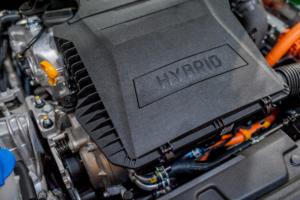 The motorized world is changing quickly, with electric and hybrid cars taking their place as cost-saving and environmentally friendly alternatives to standard internal combustion engines. Thinking of purchasing a hybrid but aren’t sure about the benefits or maintenance needs? Here are some quick facts to help you make a more informed decision.
The motorized world is changing quickly, with electric and hybrid cars taking their place as cost-saving and environmentally friendly alternatives to standard internal combustion engines. Thinking of purchasing a hybrid but aren’t sure about the benefits or maintenance needs? Here are some quick facts to help you make a more informed decision.
Which Hybrid for You?
There are currently three types of hybrid auto transmissions:
- Basic hybrid — The basic hybrid uses an electric motor to provide a power boost when needed; however, the vehicle cannot operate on electric power alone. These systems are also able to reclaim lost energy during braking (called “regenerative braking”), which adds to their fuel efficiency.
- Full hybrid — A full hybrid can operate on electric power alone, using a large onboard battery. At low speeds the vehicle operates on electric power (e.g., city driving), then switches to gasoline power at higher speeds (e.g., highway driving).
- Plug-in hybrid — Plug-in hybrids have an onboard battery that must be recharged when the vehicle is at rest. Plug-ins have the advantage of a longer all-electric operating range, making them practical for longer trips. The gasoline engine in a plug-in only takes over when the battery power becomes depleted.
All three of the above systems offer electric power, either as an assist or a replacement for fuel power. Now let’s look at some of the benefits of driving a hybrid vehicle.
Why Drive a Hybrid?
There are several very real benefits of investing in a vehicle with hybrid technology.
- Go green — If you’re concerned about climate change and the environmental impact of internal combustion engines, hybrid technology offers some clear benefits. The carbon footprint of a full or plug-in hybrid is a fraction of that of a traditional gas-powered vehicle, making it the sustainable choice.
- Reduce operating costs — Looking to save money on gasoline? A hybrid uses no gas while operating on electric power, and all energy recaptured through regenerative braking is free! Also, a recharge is far less expensive than a full tank of fuel in a conventional vehicle.
- Travel light — Hybrids are generally agile, lightweight vehicles, which allows them to take full advantage of the electric motor. And a lighter vehicle takes less energy to move.
- Boost flexibility — Until the world catches up to the electric car boom, finding a charging point can be a challenge. Driving a hybrid gives you the opportunity to fuel up or charge up, depending on what the facility offers.
Maintaining Your Hybrid Transmission
Although hybrid transmissions operate differently than conventional configurations, they still require regular maintenance and care to ensure smooth and safe operation. Here are some of the critical elements that transmission technicians check in hybrid transmissions.
- Battery pack — Although hybrid batteries are built to last (most have a lifespan of 10 to 15 years or 120k to 150k miles), the occasional failure does occur, requiring battery pack replacement. Have your battery pack checked regularly to ensure that you’re getting the most out of your hybrid.
- Electric motor — This motor moves your vehicle when on electric power only. Like any electrical motor, it should be kept clean. Malfunctions in the motor can rob your vehicle of fuel efficiency, so check that it’s operating as it should.
- Internal combustion engine — Remember that hybrids still have conventional engines that require conventional maintenance, such as oil and filter changes, to operate at peak efficiency.
- Regenerative brakes — Regenerative braking systems generate less friction than their conventional counterparts, thus requiring less maintenance and fewer repairs. But as with any braking system, regenerative brakes do wear over time and will require brake pad replacement to maintain operating performance.
- Hybrid transmission — The transmissions of hybrid vehicles are designed to run smoothly and efficiently, often with substantially less wear and friction that experienced by conventional transmissions. They do, however, require basic maintenance to replace fluids, remove grit or debris, and replace worn parts. To keep your hybrid on the road longer, stay current on transmission maintenance!
We hope you find these tips helpful. At Main Line Transmissions, our technicians are skilled in the maintenance and repair needs of today’s conventional and hybrid transmissions. Don’t skimp on regular maintenance. Keep your hybrid operating at peak performance. Call us and schedule a transmission check-up today!

 : 610-647-8484
: 610-647-8484 : 610-647-8405
: 610-647-8405